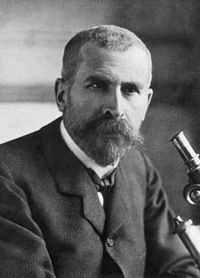Pierre Paul Émile Roux
| Pierre Paul Émile Roux | |
|---|---|

Pierre Paul Émile Roux
|
|
| Born | 17 December 1853 Confolens (Charente), France |
| Died |
3 November 1933 (aged 79) Paris |
| Nationality | France |
| Fields | Medicine, bacteriology, immunology |
| Known for |
Pasteur Institute anti-diphtheria serum |
| Influences |
Louis Pasteur Émile Duclaux |
| Notable awards | Copley Medal (1917) |
Pierre Paul Émile Roux FRS (17 December 1853, Confolens, Charente – 3 November 1933, Paris) was a French physician, bacteriologist and immunologist. Roux was one of the closest collaborators of Louis Pasteur (1822–1895), a co-founder of the Pasteur Institute, and responsible for the Institute's production of the anti-diphtheria serum, the first effective therapy for this disease.
Roux received his baccalaureate in sciences in 1871 and started his studies in 1872 at the Medical School of Clermont-Ferrand. He worked initially as a student assistant in chemistry at the Faculty of Sciences, under Émile Duclaux. From 1874 to 1878, he continued his studies in Paris and was admitted as clinical assistant at Hôtel-Dieu. Between 1874 and 1877, Roux received a fellowship for the Military School at Val-de-Grâce, but quit it after failing to present his dissertation in due time. In 1878, he started to work as an assistant to the course on fermentation given by his patron Duclaux at the Sorbonne University.
Duclaux recommended Roux to Louis Pasteur, who was looking for assistants, and Roux joined Pasteur’s laboratory as a research assistant from 1878 to 1883 at the École Normale Supérieure in Paris. Roux began his research on the microbiological causation of diseases, and in this capacity worked with Pasteur on avian cholera (1879–1880) and anthrax (1879–1890), and was involved in the famous experiment on anthrax vaccination of animals at Pouilly-le-Fort.
...
Wikipedia
